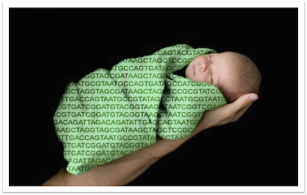With Angelina Jolie’s decision to have a double mastectomy due to a genetic test that revealed she carried the BRCa gene, the issue of genetic testing is in the forefront once again. This is the second part of a three-part essay exploring genetic testing on newborns (part one and part two) and concludes with exploring personal choices and the psychological ramifications of genetic testing.
False Positives, Lack of Empirical Evidence, and Dangers in Expanded Newborn Screening
In the year 2000, most states only screened for about four conditions. As of November 2008, most states adopted screening for the 29 recommended primary conditions and up to 25 secondary conditions (See President’s Council on Bioethics, “The Changing Moral Focus of Newborn Screening,” 36). Since no federal mandate on newborn screening exists from state to state, this number varies due to the lack of understanding of the diseases or showing no proven benefit. In fact, the twenty-five secondary conditions recommended by the American College of Medical Genetics do not need urgent treatment in the newborn period or have no proven treatment (Also see Mary Ann Baily and Thomas J. Murray, “Ethics, Evidence. And Cost in Newborn Screening” Hastings Center Report (38, 2008), 28 ).
Then there is the multiplex technology of tandem mass spectrometry (MS/ MS) that can screen for over 40 “inborn errors of metabolism” from a single drop of blood (See President’s Council, “The Changing Moral Focus of Newborn Screening,” 9). While this technology has reduced the numbers of false positives, it is still far from being reliable. This is due to screening for rare disorders on a population wide basis – about four million babies annually. To illustrate this point, in 2007, 3,364,612 infants were screened for Maple Syrup Urine Disease (MSUD) in the United States and 1,249 tested positive. After retesting, only 18 cases confirmed a positive result (See President’s Council, “The Changing Moral Focus of Newborn Screening,” 14). MSUD is a well-understood condition that shows some benefit for screening. However, when we expand screening to add conditions that are not understood as well as mandate all newborns in the United States to be tested, false positives are likely to be in the tens of thousands (See also Beth Tarini, et al. “State Newborn Screening in the Tandem Mass Spectrometry Era: More Tests, More False Positives” Pediatrics, 118 (2006), 448-456).
rare disorders on a population wide basis – about four million babies annually. To illustrate this point, in 2007, 3,364,612 infants were screened for Maple Syrup Urine Disease (MSUD) in the United States and 1,249 tested positive. After retesting, only 18 cases confirmed a positive result (See President’s Council, “The Changing Moral Focus of Newborn Screening,” 14). MSUD is a well-understood condition that shows some benefit for screening. However, when we expand screening to add conditions that are not understood as well as mandate all newborns in the United States to be tested, false positives are likely to be in the tens of thousands (See also Beth Tarini, et al. “State Newborn Screening in the Tandem Mass Spectrometry Era: More Tests, More False Positives” Pediatrics, 118 (2006), 448-456).


